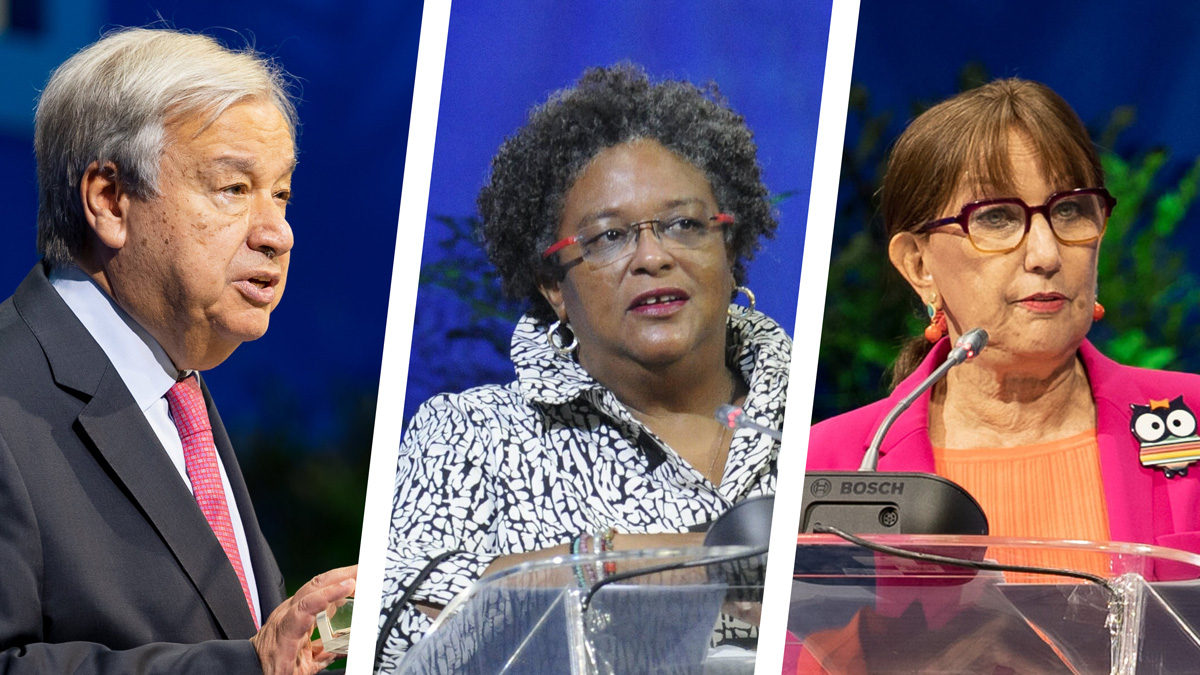UNCTAD’s 15th quadrennial conference (UNCTAD15), held from 3 to 7 October, adopted the Bridgetown Covenant to promote inclusive and resilient economic recovery in developing countries as they grapple with unequal access to COVID-19 vaccines, a debt crisis, the climate emergency and other unprecedented challenges.
Download the Bridgetown Covenant
The conference was opened in Barbados by UN Secretary-General António Guterres, Barbados Prime Minister, the Honourable Mia Amor Mottley, Kenyan President Uhuru Kenyatta and UNCTAD Secretary-General Rebeca Grynspan.
“I see four challenges, which — if not addressed — make any notion of prosperity for all a distant dream. Debt distress. Systems starved for investment. Unfair trade. And a climate emergency that leaves small island developing states like Barbados perilously vulnerable.”
António Guterres
Secretary-General of the United Nations
It was the first time the UN’s key global conference on trade and development, which occurs every four years, was hosted by a small island developing state, the first time it was chaired by two women – Secretary-General Grynspan as head of UNCTAD and Prime Minister Mottley of Barbados as president of the conference.
During the four-day conference, over 5,300 participants, world leaders, heads of state and UN agencies, government ministers, and senior officials from leading global financial institutions called for a new development model based on new agreements on global economic governance, trade, investment, debt, financing, climate change and international cooperation.
“UNCTAD was formed to give voice and protection to developing nations. If ever there was a time for that voice to be heard on issues of trade and development, it is now.”
Mia Amor Mottley
Prime Minister of Barbados
The Bridgetown Covenant adopted by UNCTAD’s 195 member States outlines a roadmap for transforming economies through economic diversification; addressing unsustainable debt burdens in developing countries; making economies more sustainable and resilient; improving how development is financed; and reimaging how multilateralism will function in the future.
Member States also adopted UNCTAD15’s political declaration, known as the Spirit of Speightstown.
Download the Spirit of Speightstown
“The two outcome documents – the Bridgetown Covenant and the Spirit of Speightstown – are a testament to not only what was agreed at this historic conference but also, most importantly, to the reasons and values that moved us to do so.”
Rebeca Grynspan
Secretary-General of UNCTAD
The fifteenth session of the United Nations Conference on Trade and Development – UNCTAD 15 – presents an opportunity for the development community to align the 2030 Agenda on Sustainable Development with the global “new normal” created by the COVID-19 pandemic. As a major United Nations conference of the “decade for action” for achieving the Sustainable Development Goals, the ministerial conference must address the massive unmet trade, finance, investment and technology needs of developing countries struggling in the face of the COVID-19 challenge.
The pandemic led to an economic standstill, closed borders and a severe retrenchment in cross-border economic activity – this has effectively paralysed trade as an engine for sustainable prosperity. Compounded by the “pre-existing” lack of trust in multilateralism, the global trading system was woefully unprepared for this global health crisis.
The most vulnerable countries continue to be the hardest hit by the pandemic, at a time when they were already not doing well. The pandemic and its fallout have exposed existential challenges to the very tenets of globalization and will have a lasting impact on future efforts by developing countries to gainfully benefit from the global economy.
In addition, COVID-19 revealed the urgency of the need to transform global approaches to trade and development if we are to chart a sustainable course to a better recovery. UNCTAD 15 gives us a window of opportunity to build the political will to effect the systemic changes needed to ensure a better recovery, as countries have realized the devastating limits of current development practices. From a trade and development perspective, a better recovery must be green, resilient, just and digital – but it must also be for all peoples and all countries, not just those who can afford it.
In the past, UNCTAD ministerial conferences generated ambitious solutions and rebuilt goodwill among nations. UNCTAD 15, hosted by Barbados, must be such a conference. It must offer hope to vulnerable small island developing States facing lost tourism and travel revenues; it must offer feasible instruments to African countries and least developed countries looking to develop their productive capacities; and it must offer a path forward on debt forgiveness and digital cooperation, especially for middle-income countries.
As part of the programme of the Conference, to be regularly updated, a series of online pre-events and forums are being organized between May and September 2021 to pave the way for UNCTAD 15.
Together with Barbados, as the host country, and with the resolute commitment of the entire UNCTAD membership, we can achieve a sustainable path forward under the Conference theme “From inequality and vulnerability to prosperity for all”.

